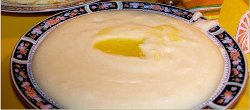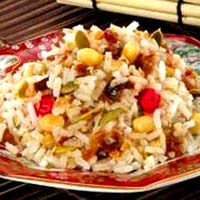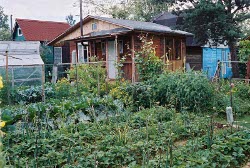Categories: "Food"
Каша

Каша means any type of boiled grain. No ethnic group eats more boiled grain than the Russians. And we're not talkin’ just plain old cream of wheat. We're talkin’ oatmeal, buckwheat, rice, barley... you name it.
Probably the most popular version is манная каша cream of wheat, which is also called манка. In the States we like to think that grain products are healthy for us, but манка is usually boiled up in sugar water, sweet as can be, and then served in a bowl... and then you slice off, oh, say, a quarter kilo of butter and set it on top of the steaming cream of wheat. It then melts into a magnificent golden puddle that covers the манка. It's gloriously delicious. My carotid clogs at the very thought.
Овсяная каша is oatmeal; it is also called овсянка. Гречневая каша is porridge made from buckwheat (not related to wheat); it is also called гречка. Everyone who serves in the Russian army eats copious quantities of гречка, and once they are out of the service, they never want to see the stuff again.

Каша is not always sweet, and it's not just for breakfast. Any of the каши can be boiled up with meat or other main dish ingredients, thrown into a casserole dish with mushrooms, and then baked in the oven for supper, like the рисовая каша с овощами, rice kasha with vegetables, pictured to the left (recipe | mirror). Каша is also used as stuffing in пирожки.
Огород

When talking about food, it is important to mention the concept of огород, the individual plot of land, typically small, where people grow their own vegetables. Sometimes they also plant a few fruit trees, providing themselves with fruit: pears, apples, cherries, etc. The importance of огород can not be underestimated. If not for the огороды, during the Soviet era and post-Soviet collapse millions of people would not have made it: literally, they would probably have starved to death. Statistics show that, for example, in Soviet times, the individual plots of land made up around 30% of arable land, whereas колхозная земля (factory farm land) was over 70% of the arable land, and yet «колхозные земли производили меньше, чем пятьдесят процентов овощей» “factory farm lands produced less than 50% of [the country's] vegetables!” The difference is startling, no?!
Many wonder how such a difference in crop yield could be explained?? There are some theories on that account that circulate. The one I like the most is the theory of “love energy.” It states that all is energy, and where we put loving energy, there life flourishes, in all its manifestations and forms, because love is the only energy that sustains life. Plants also feel it, and respond to this energy accordingly. So, on individual plots of land people tend to their plants with love, and so they respond with magnificent yields. Whereas on factory farm land all is обезличено depersonalized. Machines are in charge of everything, and so the plants are not used to their full potential. In J. Redfield's "The Celestine Prophecy" it talks a lot about it. Recently, I also discovered the long-time Russian best-seller "Anastasia: Ringing Cedars of Russia" series, where they also talk extensively on the subject. I learned about this series from an interview with L. Sharashkin, which is amazing in its content; when I listened to it, it was eye-opening in a lot of ways to me: after that interview I wanted so much to read the "Anastasia..." books. I found them on-line, and, amazingly, it also talked a lot about the "plant issue"!
Anyway, to finish off my contribution, I would say that up to this day Russians are very fond of their land plots, and grow (with love!) a significant share of their food supply on their private plots, огород. BTW, those огород vegetables are millions times more delicious than vegetables we sometimes eat from factory farms!
Печенье

The Russian word for cookie is печенье. Making cookies from scratch is a lot of fun for me because I can experiment with different ingredients. Every year, I make a variety of different types of cookies for Christmas to give away to friends and family. I especially enjoy dusting the tops of my cookies with red красный and green зелёный colored sugar to give them a Christmas like appearance. I like sugar cookies because I can cut them out in different shapes such as bells колакола, stars звёзды, Christmas trees ёлки, and snow men снеговики.
Last Christmas, my friend was coming to visit me from California. I wanted to make him a few of my favorite Christmas cookies and wrap them up in a beautiful Christmas box. When he arrived, I presented him with my box of Christmas cookies and asked him to try a few. I was pleased when he said «Как вкусно! Я люблю, когда ты делаешь рождественские печенья!» “How tasty! I love when you make Christmas cookies!” He finished all my cookies within the hour which gave me concrete evidence that he truly liked my cookies.
Don's additional comments: the word печенье is grammatically neuter and singular. It is often used as a mass noun, so Olga's friend could also have said «Я люблю, когда ты делаешь рождественское печенье!» where «рождественское печенье» is singular. The sentence would have meant the same thing. That's right: the English plural word “cookies” is most often translated by the singular Russian word печенье.
Яблоко (часть первая)
The Russian word for apple is яблоко. When I was a child, my aunt planted three apple trees in her back yard. She adored baking and intended to use the apples to make homemade apple pies. A few years went by and the trees began producing an unbelievably large amount of apples. I remember helping my aunt pick the apples off the trees and by the time we were done with one tree, we probably had enough apples to make pies for the whole city. The apples were large and when I took a bite, the flavor was so sweet and the apple so juicy that I immediately fell in love with the taste of my aunt’s apples. I said «Тётенька, твои яблочные деревья производят самые сладкие и сочные яблоки!» “Aunty, your apple trees produce the sweetest and juiciest apples!”. My aunt smiled at me and said «Я думаю, что мои яблочные пироги будут очень вкусные» “I think that my apple pies will be very tasty.”
Because my aunt had more apples than we could use, she often sold them at the market. She said «Ты хочешь пойти со мной на рынок, чтобы продать яблоки?» “Do you want to go to the market with me to sell the apples?” I became very excited every time I went to the market with my aunt because I enjoyed talking to the big crowd of people who came to buy my aunt’s apples.
Don's additional notes: яблоко has an irregular nominative/accusative plural яблоки. The genitive plural is яблок.
Пиво

The Russian word for beer is пиво. In Russia beer is a very common drink among construction workers, and many beer brewers sell their beer around these locations because of the good business. On a hot summer day many Russians find that cold beer is one of the most satisfying beverages. My grandfather spent most of his life working as a construction worker and found it very rewarding to enjoy a cold beer after work with his friends. He would say «Друзья! Давайте купим пиво сегодня после работы» “Friends! Let’s buy beer today after work”. On weekends I often saw that my grandfather invited his friends for some beer and television.
Beer also can be used as a hair rinse because it promotes hair shine and strength. A few years ago my mother invited a friend to our house while I was getting ready for a night out with friends. I wanted to take a shower and use beer as my hair rinse so without thinking twice, I went to the kitchen and poured some beer into a plastic cup. As I walked past my mother and her friend, I said «Я пойду принять душ» “I am going to take a shower,” and I continued walking with my cup of beer. My mother’s friend stopped me and asked «Почему ты берёшь кружку пива с собой в душ?» “Why are you taking a cup of beer with you to the shower?” I realized how awkward the situation was and began laughing because I knew that I looked funny standing with a robe халат, towel полотенце, and a cup of beer in my hands. I explained this remedy to my mother’s friend, and since then she too has been using this remedy.
Don's additional comments: There are quite a few songs about beer in Russian, among them Ода пиву “Ode to beer” by Тимур Шаов, Пора по пиву “Time for a beer” by А.Ивашенко and Г.Васильев, the rhythm-and-bluesy Холодное пиво by Аквариум, Гимн пиву “A hymn to beer,” and the rock-and-rollsy Пиво “Beer” by Группа Чайф. But the song that makes me laugh the hardest is the frenetic dance tune «Пей пиво» by Дискотека Авария. Click this link to see the video, lyrics, and translation.
<< 1 ... 9 10 11 ...12 ...13 14 15 ...16 ...17 18 19 ... 21 >>